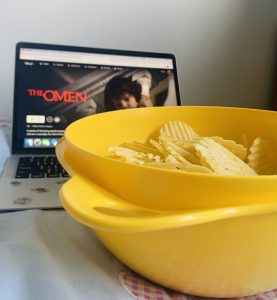‘The Godfather’ – An influential classic that stills holds up today
‘The Godfather’ stands as one of the benchmarks in movie-making to this day, leaving an indelible mark on our culture that has lasted nearly 50 years.
Indeed, many readers may have never seen Francis Ford-Coppola’s adapted masterpiece about the fall and rise of a 1940’s Sicilian-American crime family in New York.
However, I’ll bet most of you recognise this famous Marlon Brando line as Don Vito Corleone:
“I’m going to make him an offer he can’t refuse.”
You might be totally unaware of the Corleone’s story. Perhaps you’ve never even heard of this three-part saga which raked in a total of nine Academy awards from 1972-1990 (the much-maligned Part III accounting for zero of those Oscars).
Even if that’s true, ‘The Godfather’ will still have played a significant role in your movie-going/TV watching life.
The Godfather’s influence on modern pop culture
Perhaps no single piece of media; movie, song or book has had more influence on modern pop-culture than ‘The Godfather’.
It’s honest and gripping portrayal of family dynamics, the changing psyche of the anti-hero, and the effects of limitless power have gone on to inspire many seminal modern works.
Morgan’s describes his depiction of reigning British Monarch Queen Elizabeth’s rise to power as: “The Michael Corleone story, but with less violence.”
In that same piece, Morgan references HBO’s ‘The Sopranos’, as another inspiration for ‘The Crown’ and creating a link between the TV Drama and Coppola’s film isn’t difficult. Paulie Gualtieri’s car horn literally plays the Godfather’s theme music in the first season.
You could argue everything from Martin Scorcese’s ‘Goodfellas’ or ‘The Irishman’, to the beloved if not politically-incorrect ‘Simpsons’ character, Fat Tony, all stem from ‘Godfather’ — but it’s not just Mafia movies that draw from the film.
Oranges have deep symbolic meaning in Coppola’s trilogy, their presence often signalling impending danger. When Don Vito is shot, he is buying oranges. When he later dies, he’s peeling an orange.
In ‘Point Break’, Keanu Reeves and Garey Busey are offered oranges just before a bloody shootout.
All this is to say, ‘The Godfather’ transcended itself as a movie, its branches of influence growing so large it reached an 80’s action hit like ‘Point Break’.
As I was watching this film made in 1972 now in 2020, I was struck at how modern it felt.
‘Butch Cassidy and the Sundance Kid’, another all-time classic was made just three years previously, but it feels so much more dated than ‘The Godfather’, and a lot of this is because of Coppola, and his genius filmmaking.
The Brilliance of Francis Ford-Coppola
From the opening frame, you are immediately hooked as Don Corleone sits in his office, hearing the appeals from his wedding guest, Bonasera. Here Brando gives another of his most famous speeches:
“I understand. You found paradise in America, you had a good trade, you made a good living. The police protected you and there were courts of law. And you didn’t need a friend like me. But uh, now you come to me and you say – ‘Don Corleone, give me justice.’ But you don’t ask with respect. You don’t offer friendship. You don’t even think to call me Godfather. Instead, you come into my house on the day my daughter is to be married, and you ask me to do murder for money.”
The dialogue is crisp. The performance, masterful.
You’re already in from then. Brando mesmerises with his charm and presence. We learn about Sicily, about their customs, and you immediately get a sense of who the Don is. You understand his power, his motivation. It sets up the movie brilliantly.
The Wedding as a set-piece to open the film feels very like HBO’s ‘Succession’, with all the main characters in the same place at the same time, performing their specific roles.
In that first scene, we also meet Robert Duvall’s character Tom Hagan, consigliere to the Don. James Caan as Santino/Sonny Corleone brings his brash, bravado to the picture, something which becomes pivotal in his later demise as he rushes to defend his sister, only to be gunned down in one of the most brutal movie deaths you’ll ever see.
Finally, we meet Michael Corleone. While Brando won the Oscar for Best Actor for this movie, Al Pacino as Don Corleone’s youngster Son Michael is breathtaking from the moment he is on screen.
I don’t know how it felt in 1972, but I was floored by Pacino’s performance throughout the film. We are presented with a quiet and unassuming war-hero, happy to be home and sharing a drink with his girlfriend Kay Adams (an almost unrecognisable Diane Keaton, to my untrained eyes).
However, as he talks about his families dealings, you become aware of how calmly Michael talks about the violence, setting up his cold and collected rise to prominence later in the movie.
We get all of this in the first set-piece of the film. It’s magical.
Coppola succeeds in keeping the audience’s sympathy for the Corleones intact throughout the film, so that he can tell his tale of the twisted American dream, where Don Corleone wishes to avoid giving his family business to his most brilliant son, but through a life of crime, condemns him to it.
Family and power
As the Corleone family crumbles, rival mobsters almost killing the Don and leaving his sons to pick up the pieces, we watch as these complex family dynamics play out on screen.
Fredo, Michael’s older but meek brother succumbs to his feelings of inferiority and responsibility for not protecting his father, taking up a life in Las Vegas as an apprentice of Moe Greene, where he almost betrays the family.
Sonny, unable to keep collected as the Don, gives into his rage and pays the price.
Michael on the other hand, slowly becomes his father, except more ruthless having long been kept out of the family’s dirty business because of his intelligence.
In one of the last moments between Vito and Michael, a brilliant scene in the garden of the family home, Vito tells Michael that he never wanted the mob life for him, saying he wanted him to be a senator.
It’s too late for Michael by then, and for Vito. Michael has been doomed to follow his father’s path forever, and although Vito wants him out of the mob-game, Michael is only getting started.
It’s these complex ideas that sets ‘The Godfather’ apart. In the 21st century, we have seen the anti-hero story played out in brilliant ways. ‘Breaking Bad’, being perhaps the best modern day examination of how violence and power can drive even a good man to evil.
After protecting his father from crooked cops and would be murderers, Michael takes matters into his own hands, killing family rival Virgil Sollozo and Captain Mark McCloskey, cementing his path towards leading the family and a life of crime.
In that seminal scene, Pacino’s performance goes up a gear. You feel his metamorphosis as he shakes while waiting to pull his gun from out under the table. As he pulls the trigger on Sollozo, his transformation is complete.
Michael goes into hiding in Sicily, where he finds a wife who is ultimately taken from him by rival families. This is, in my opinion, is the worst part of the movie, and I couldn’t wait to get back to the story in America — but it does show Michael’s further descent into Mafia life.
Upon hearing of his brother’s murder, Michael returns home, where he begins his reign on top of the Corleone family. Unlike his father, who in a previous scene chose to bargain with his enemies, Michael lays waste to his rivals, in a bloody massacre.
Using his newfound cold and cunning leadership, Michael takes back control of his family, with blood on his hands and his potential future as a normal civilian, gone.
Whilst these themes, and the meticulous depiction of Michaels journey into savagery are what makes ‘The Godfather’ brilliant, what makes it influential is almost more simple than that.
It’s just a good movie. The storyline, the characters, what’s good and bad all pale in comparison to the way it makes you feel.
The way it’s shot, the music, the deep moments of tension and the brilliant dialogue — that’s what makes a movie great.
This may sound criminal, but if I were to compare it to something like ‘The Dark Knight‘ — watching Christian Bale and the late, great, Heath Ledger tussle in Christopher Nolan’s Batman tale —and nitpick the themes, the story, and the character arcs, it wouldn’t hold up.
However, if you just watch the movie and let the magic on screen take you away, you don’t care what’s happening, you just want to watch more of it.
Summary
That’s my lasting impression of ‘The Godfather’. It was enjoyable to be in Coppola’s world for the movie. I wanted more and more of Brando and Pacino’s performance.
Coppola manages to make a deeply meaningful film, which explores these relationships and Michael’s changing psyche, while also keeping you totally gripped throughout. The violent sequences are often played in contrast to the more intimate scenes. It’s a constant push and pull effect which makes you hang on to every second.
And in summary, once again, it’s important we remember this film was made almost 50 years ago.
I have no desire to inhabit 1972, as the ending days of the Vietnam War were matched by Bloody Sunday in Belfast.
We had no mobile phones, post-it notes and the first ever commercial calculator was put on sale for close to $500.
But somehow, Francis Ford Coppola got his hands on a story and turned it into a masterpiece, the likes of which filmmakers are still trying to surpass.
In short, almost everything is infinitely better in 2020 than in 1972. However, there is maybe a handful of pieces of pop culture which can compete with ‘The Godfather’, and one of them is ‘The Godfather Part II’.


Be the first to comment!